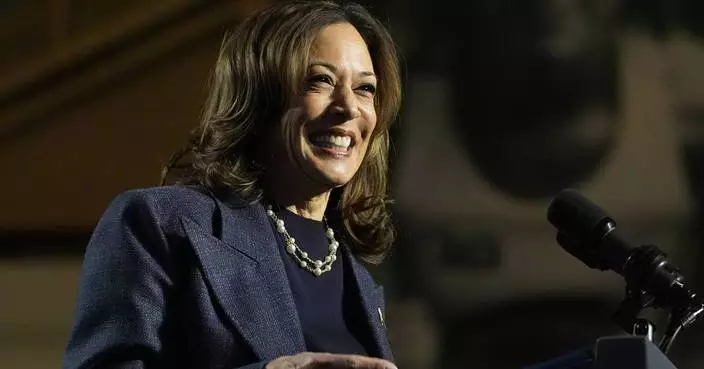NEW YORK (AP) — New York's mayor urged residents to take shorter showers, fix dripping faucets and otherwise conserve water, issuing a drought watch Saturday after a parched October here and in much of the United States.
A drought watch is the first of three potential levels of water-saving directives, and Adams pitched it in a social media video as a step to try to ward off the possibility of a worse shortage in the United States' most populous city.
“Mother Nature is in charge, and so we must make sure we adjust,” said Adams, a Democrat.
He ordered all city agencies to get ready to implement their water conservation plans. He asked the public to do its part by, for example, turning off taps while brushing teeth and sweeping sidewalks instead of hosing them down.
The mayor also exhorted residents to report opened-up fire hydrants and other street leaks. The recommendation comes days after the city fixed a leaky Brooklyn hydrant that fed a homespun goldfish pond on the sidewalk.
Just 0.01 inches (0.02 cm) of rain fell last month on the city's Central Park, where October normally brings about 4.4 inches (11.2 cm) of precipitation, National Weather Service records show. City Department of Environmental Protection Commissioner Rohit Aggarwala said it was the driest October in over 150 years of records.
Complicating the water squeeze, the city is repairing a big, leaky aqueduct that carries water from the Catskill region, so residents are relying more on reservoirs in the city's northern suburbs. That area got 0.81 inches (2 cm) of rain last month, about one-fifth the October average, the mayor's office said in a release Saturday.
New York City uses an average of 1.1 billion gallons (4.2 billion liters) of water a day. That is about 35% below a 1979 peak. The city attributes the decrease to such factors as improvements in spotting leaks.
Last month, nearly half the country was in a flash drought, which means a rapid dry-out from a combination of little precipitation and abnormally high temperatures. The Northeast capped the month with an unusually — one might even say weirdly — warm Halloween, with temperatures hitting the high 70s and low 80s (24 to 28 Celsius) from New York to Maine.
Experts attributed the flash drought to a weather pattern that kept moisture from moving north from the Gulf of Mexico.
The dry weather constrained shipping on the Mississippi River and contributed to wildfires in the Midwest and the East.
The National Weather Service continued Saturday to warn of elevated fire risk in places including Connecticut, where a firefighter was killed last month while battling a dayslong brush blaze apparently sparked by a poorly doused campfire.

FILE - A bottle containing NYC tap water is displayed at a news conference about repairs occurring to the water supply infrastructure in New York, Sept. 30, 2024. (AP Photo/Seth Wenig, File)
NEW YORK (AP) — U.S. stocks are drifting lower Monday ahead of a momentous week full of potential flashpoints, but other markets are already moving more sharply, including a rise for oil prices and drops for Treasury yields.
The S&P 500 was slipping 0.2% in afternoon trading, but remains near its record set last month. The Dow Jones Industrial Average was down 210 points, or 0.5%, as of 12:36 p.m. Eastern time, and the Nasdaq composite was 0.1% lower.
Marriott International fell 1.6% after reporting weaker profit for the latest quarter than analysts expected. But Fox climbed 3.8% after reporting a stronger profit than expected. That was despite increases in some costs, including for newsgathering at Fox News to cover this election cycle.
Election Day will arrive Tuesday, but its result may not be known for some time as officials count all the votes. That’s raised fears about the possibility of sharp swings around the world because markets infamously hate uncertainty.
History may be less foreboding. The broad U.S. stock market has historically gone on to rise regardless of which party wins the White House. And in 2020, U.S. stocks climbed immediately after Election Day and kept going even after former President Donald Trump refused to concede and challenged the results, creating lots of uncertainty. A large part of that rally was due to excitement about the potential for a vaccine for COVID-19, which had just shut down the global economy.
“Bottom line – the US election is incredibly important, but the process is likely to be incredibly noisy,” according to Michael Zezas, a strategist at Morgan Stanley.
For markets, Zezas also points to how prices may have already moved ahead of expected outcomes from the election. A win for Trump this election could mean U.S. tariffs on Mexican imports, for example, which could hurt the value of the Mexican peso. But the peso has already fallen against the U.S. dollar in recent months, which could limit further moves if a Trump win were to actually happen.
A Trump victory would also be less of a surprise to markets this time around than in 2016, when Treasury yields soared amid expectations for tax cuts that could fuel a stronger U.S economy or further inflate the nation's debt. Treasury yields have already climbed in recent weeks, in part due to rising expectations in some market corners for a Trump win, along with a spate of reports showing the U.S. economy has remained stronger than feared.
On Monday, Treasury yields gave back a chunk of those gains. The yield on the 10-year Treasury fell to 4.30% from 4.38% late Friday.
Another investment that’s become a barometer in the market for Trump’s perceived chances of victory was swinging sharply. Trump Media & Technology Group veered between a loss of 3.8% and a gain of 6.3% within the first half hour of trading. It was most recently up 4%.
The stock of the company behind Trump's Truth Social platform had been ripping higher from a bottom in September, until it hit a wall last week and dropped at least 11% in three straight days.
In the oil market, the price for a barrel of U.S. crude rose 2.5% to $71.24 after Saudi Arabia and other oil exporters said they would delay plans to increase the amount of crude they produced. Brent crude, the international standard, rose 2.3% to $74.81.
The price of Brent is still down for the year so far, in part because of worries about how much demand China will provide given challenges for the world's second-largest economy.
The Standing Committee of China’s National People’s Congress is meeting this week, and analysts are predicting the government may endorse major spending initiatives to boost its economic growth amid troubles for the real-estate industry.
Beyond that meeting and Election Day in the United States, this week will also feature the latest meeting of the Federal Reserve, where the widespread expectation is for it to cut its main interest rate for a second straight time.
The Fed kicked off its rate-cutting campaign in September with a larger-than-usual cut of half a percentage point, as it widens its focus to include keeping the job market humming. It's a sharp turnaround after the Fed kept its main interest rate at a two-decade high in order to slow the economy enough to stamp out high inflation.
The hope that's propelled U.S. stock indexes to records recently is that the U.S. economy can manage to avoid a long-feared recession, in part because of the coming cuts to rates expected from the Fed.
On Wall Street, Nvidia rose 1.8% and was the strongest force pushing upward on the S&P 500. That's often been the case in recent years as demand surges for its chips that are powering the move into artificial-intelligence technology.
Nvidia's stock has been so strong that S&P Dow Jones Indices said on Friday that it and Sherwin-Williams will join its Dow Jones Industrial Average. They are replacing Intel and Dow, the chemical company. Sherwin-Williams climbed 3.7%.
Several nuclear power plant operators slipped. U.S. regulators on Friday denied Talen Energy’s request to increase the amount of power it gives an Amazon data center from the Susquehanna plant in Pennsylvania. The company and its peers are increasingly making deals with data center operators to help feed their growing need for more power.
Talen fell 3.7% and Vistra slipped 2.6%.
Constellation Energy stumbled 10.4%. It is planning to restart the Three Mile Island nuclear plant in order to supply Microsoft’s data centers.
In stock markets abroad, indexes were mostly lower after rising in much of Asia.
AP Business Writer Elaine Kurtenbach contributed.
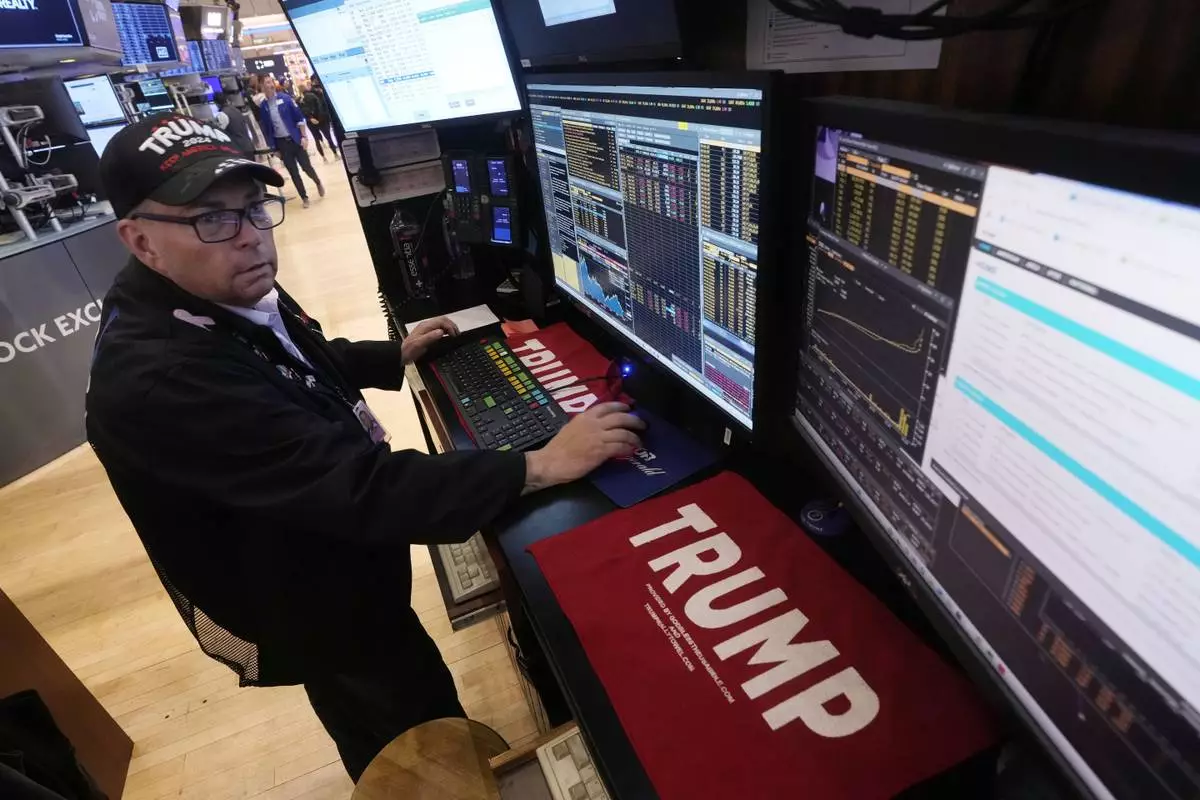
Trader Jonathan Mueller works on the floor of the New York Stock Exchange, Monday, Nov. 4, 2024. (AP Photo/Richard Drew)
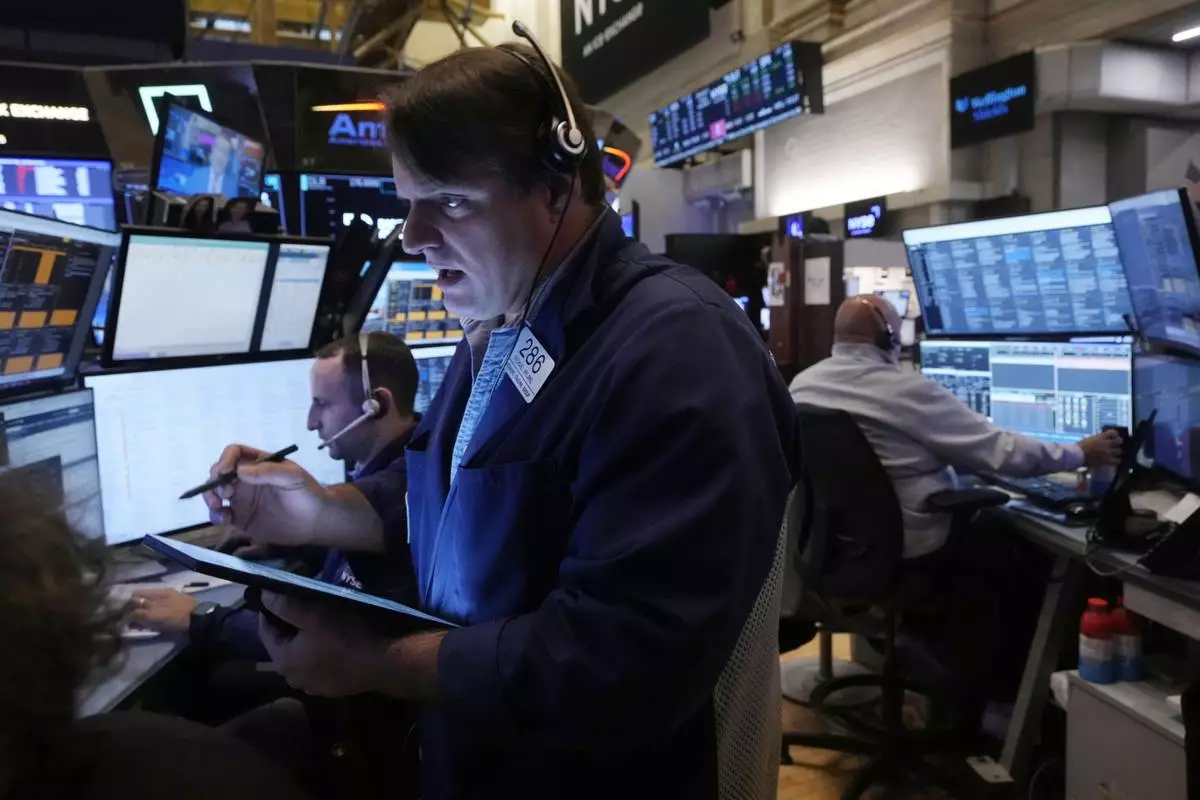
Trader Michael Milano, foreground, works with colleagues on the floor of the New York Stock Exchange, Monday, Nov. 4, 2024. (AP Photo/Richard Drew)
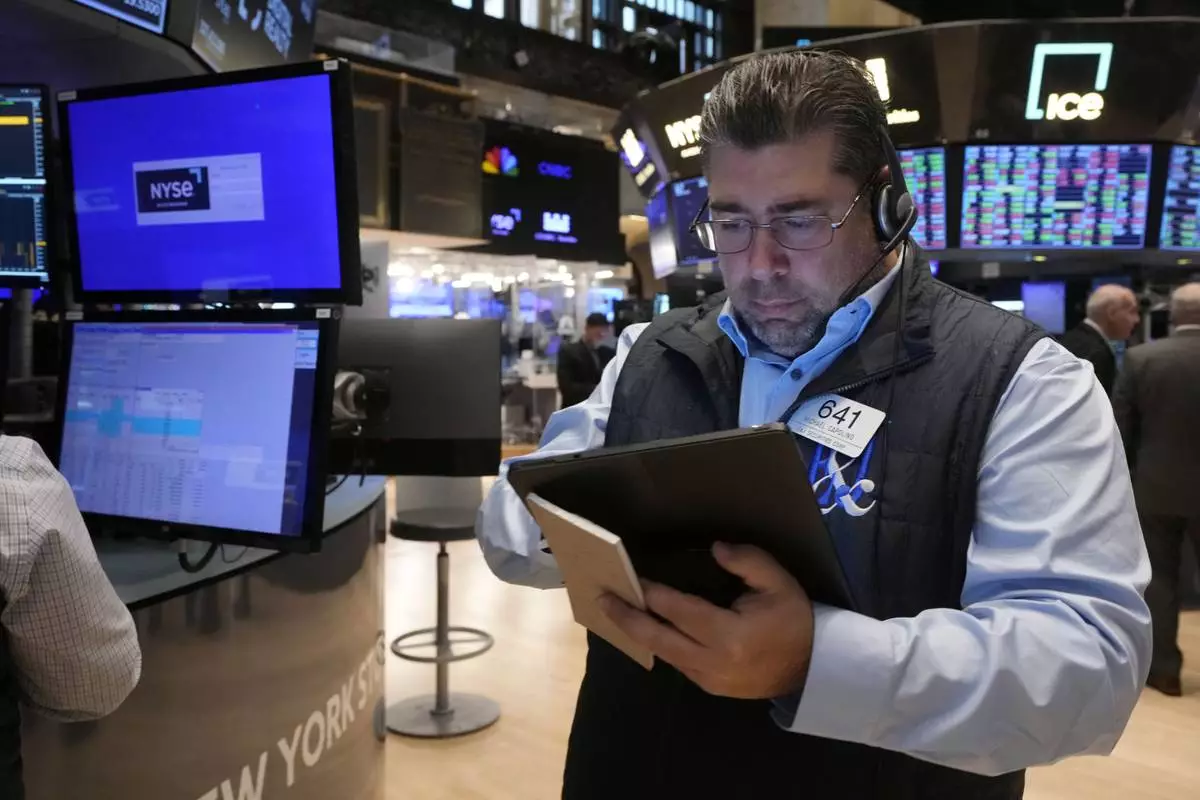
Trader Michael Capolino works on the floor of the New York Stock Exchange, Monday, Nov. 4, 2024. (AP Photo/Richard Drew)
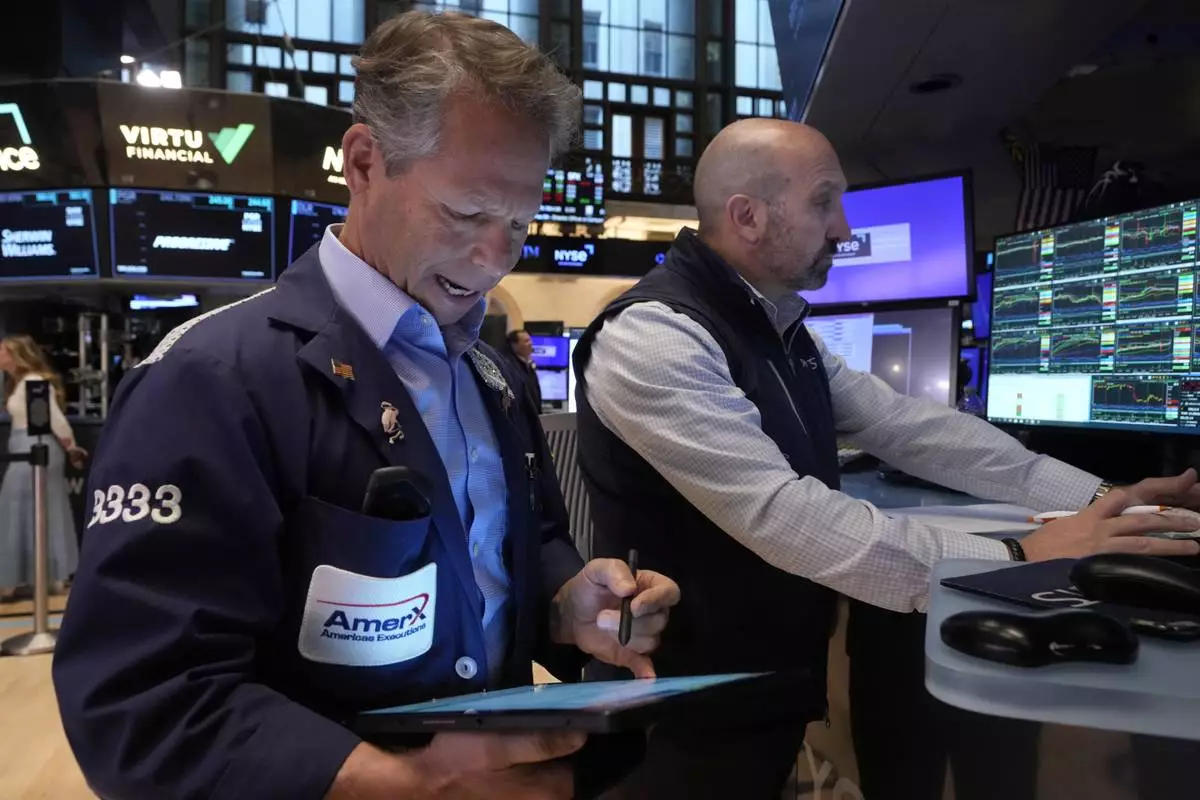
Trader Robert Chamak, left, and specialist James Denaro work on the floor of the New York Stock Exchange, Monday, Nov. 4, 2024. (AP Photo/Richard Drew)
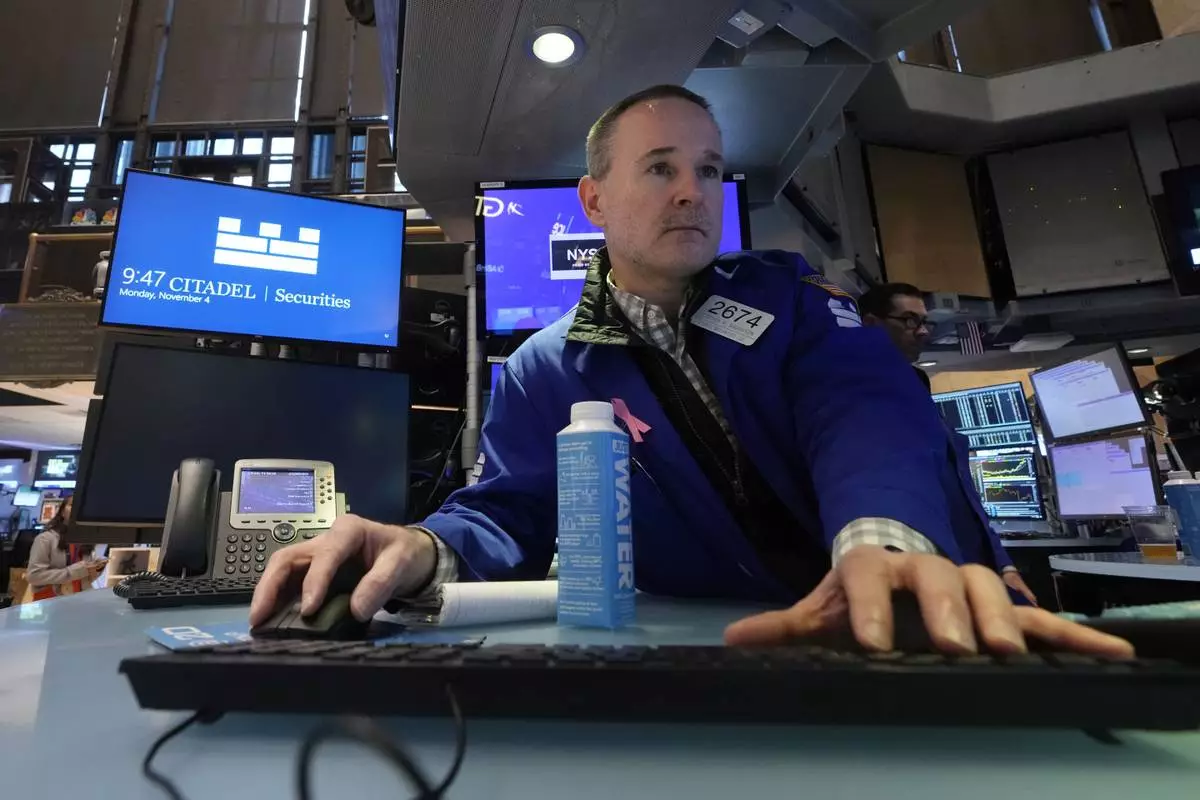
Specialist Stephen Naughton work at his post on the floor of the New York Stock Exchange, Monday, Nov. 4, 2024. (AP Photo/Richard Drew)
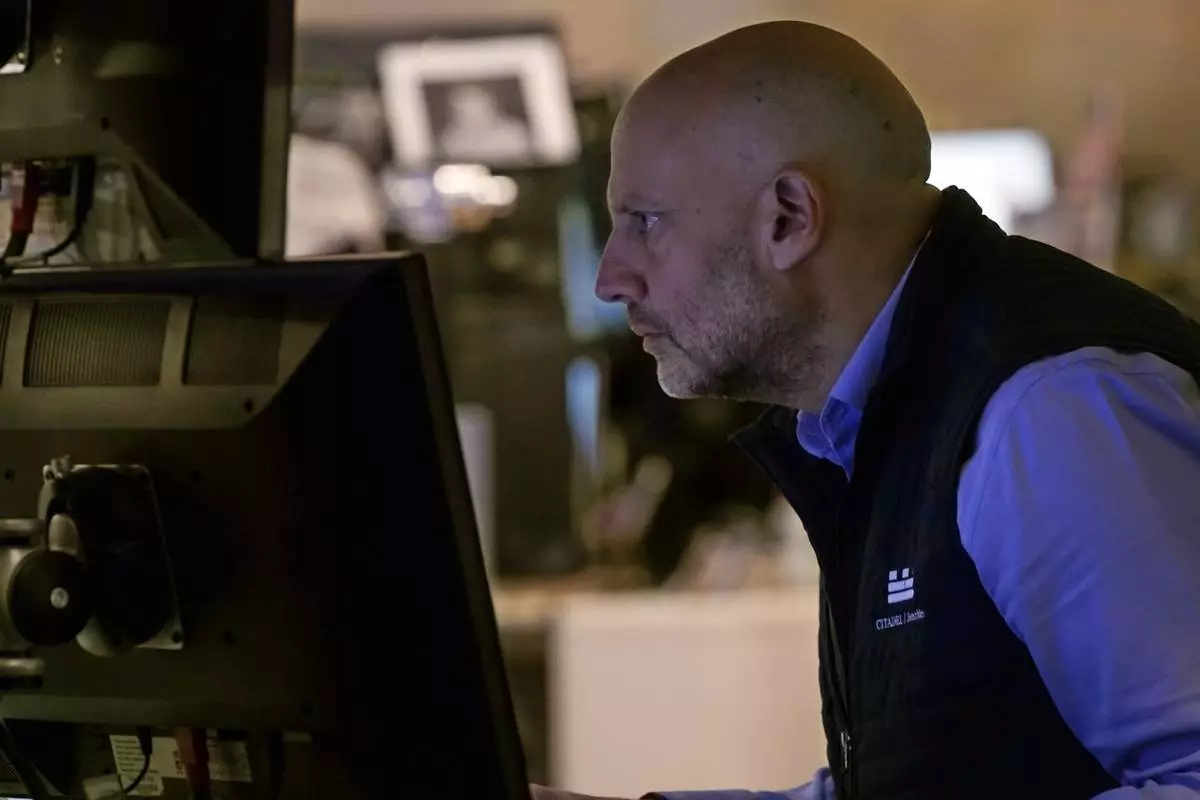
Specialist Meric Greenbaum work at his post on the floor of the New York Stock Exchange, Monday, Nov. 4, 2024. (AP Photo/Richard Drew)
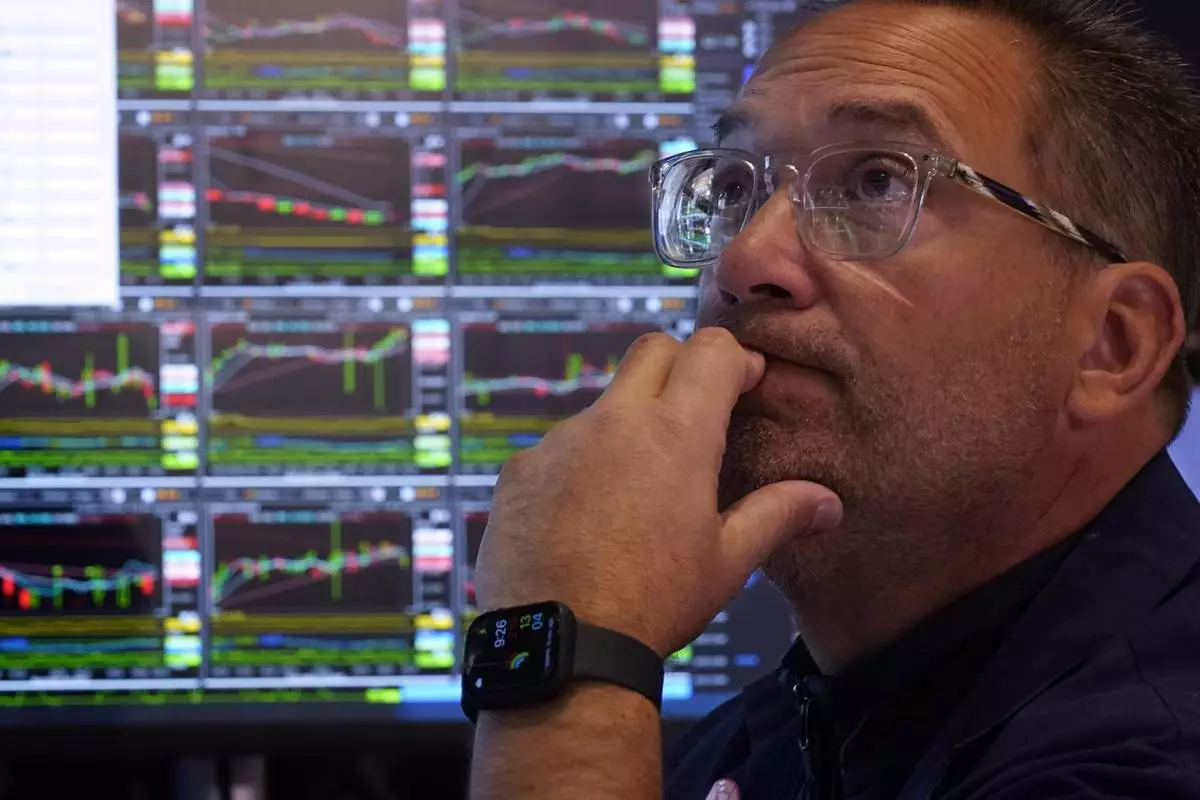
Specialist Anthony Matesic works at his post on the floor of the New York Stock Exchange, Monday, Nov. 4, 2024. (AP Photo/Richard Drew)
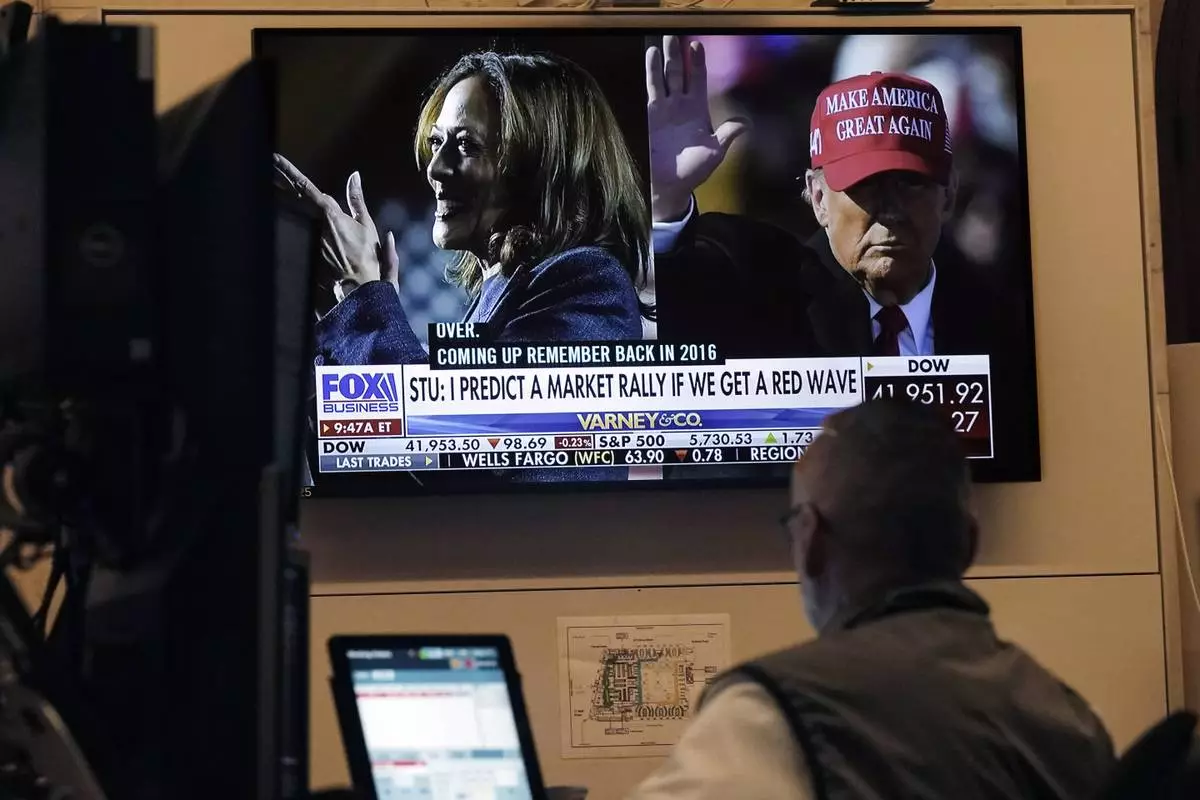
A screen on the floor of the New York Stock Exchange, Monday, Nov. 4, 2024 shows a broadcast talking about Kamala Harris and Donald Trump. (AP Photo/Richard Drew)

FILE - A sign marking Wall Street is shown near Trinity Church in New York's Financial District on Oct. 30, 2024. (AP Photo/Peter Morgan, File)
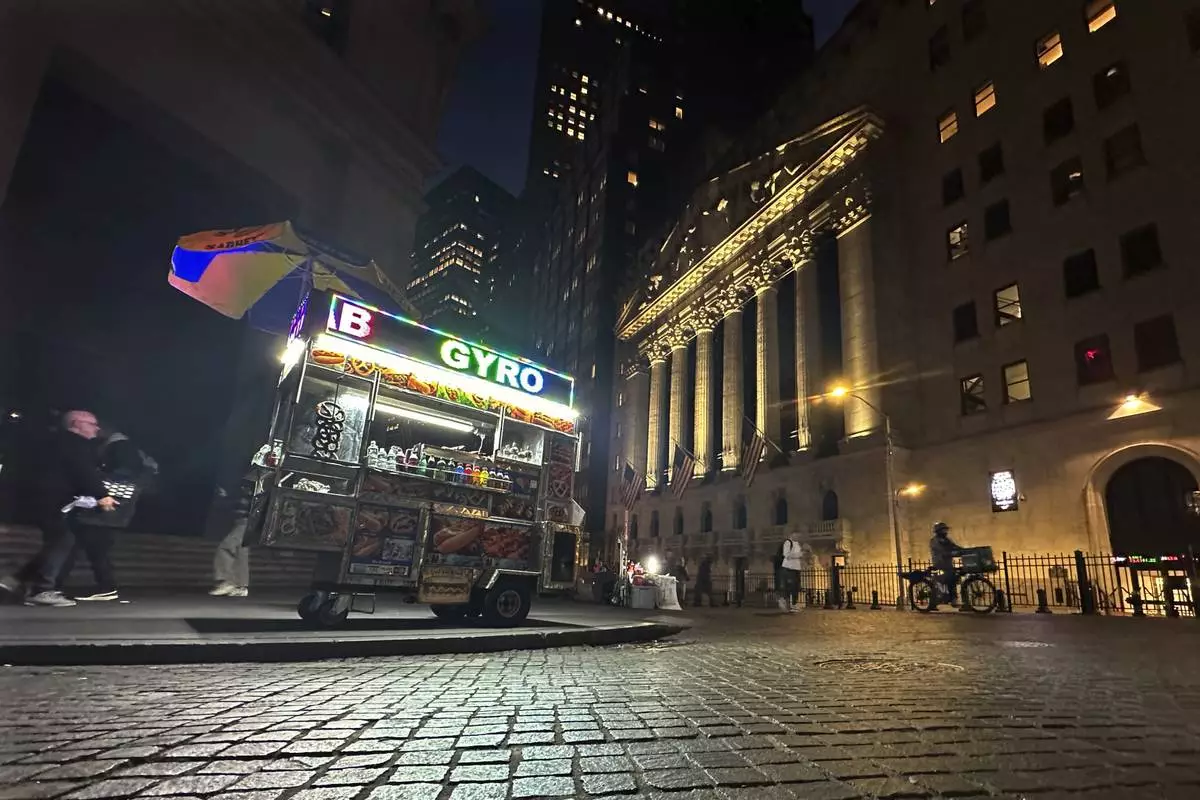
A food vendor's cart is parked across from the New York Stock Exchange on Wednesday, Oct. 30, 2024. (AP Photo/Peter Morgan)
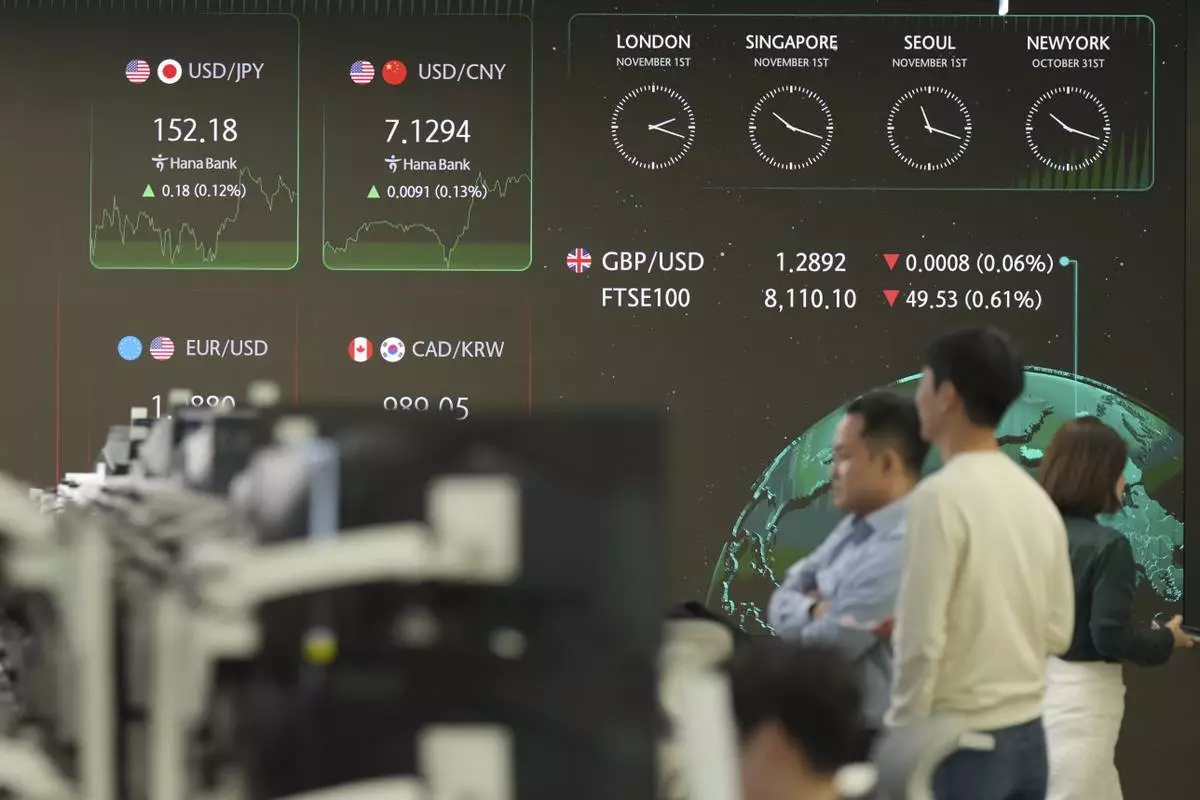
Currency traders talk near the screen showing the foreign exchange rates at a foreign exchange dealing room in Seoul, South Korea, Friday, Nov. 1, 2024. (AP Photo/Lee Jin-man)

Stock market today: Asian shares are mostly higher as China begins major economic meeting

Stock market today: Asian shares are mostly higher as China begins major economic meeting
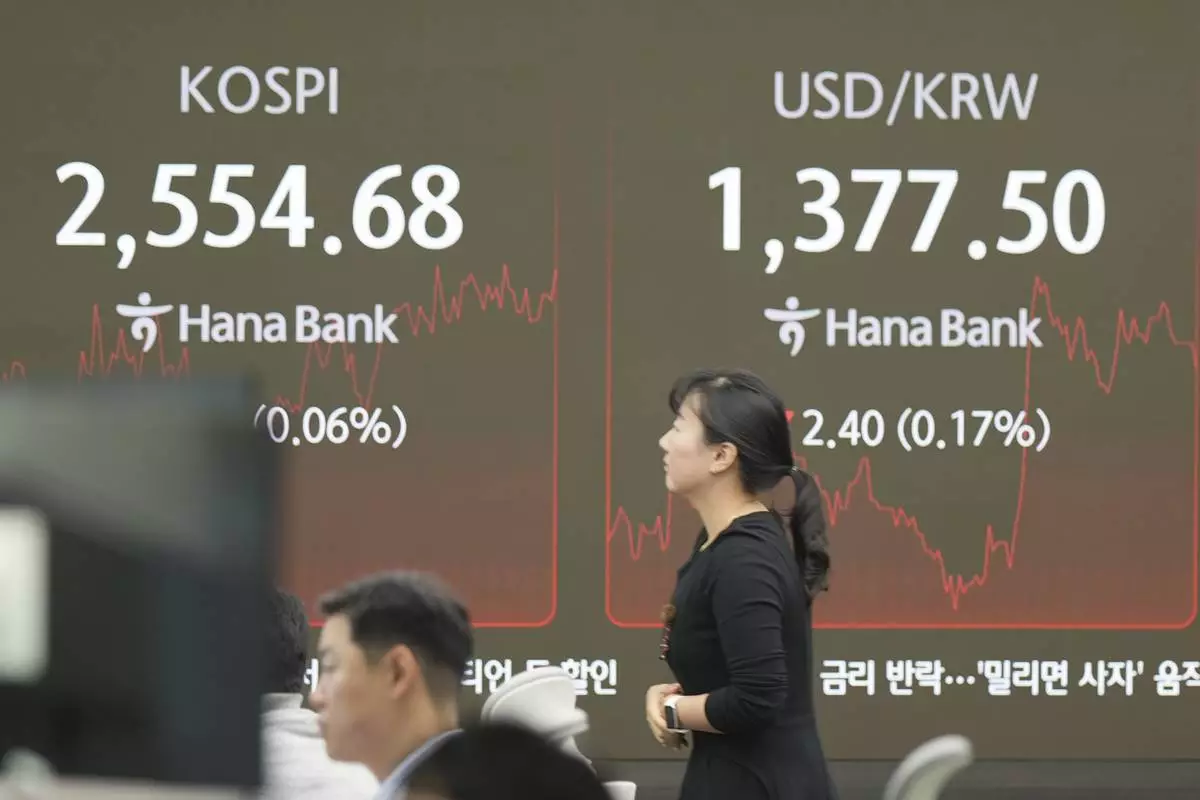
A currency trader walks by the screen showing the Korea Composite Stock Price Index (KOSPI), left, and the foreign exchange rate between U.S. dollar and South Korean won at a foreign exchange dealing room in Seoul, South Korea, Friday, Nov. 1, 2024. (AP Photo/Lee Jin-man)




















